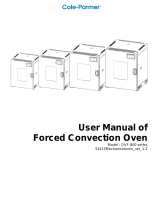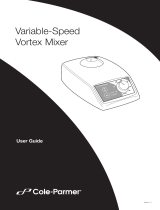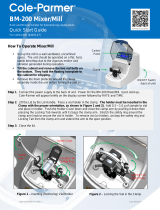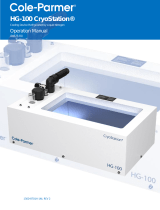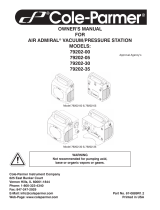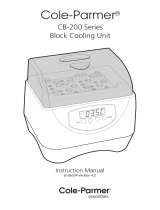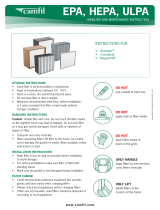Page is loading ...

Cole-Parmer® Basic PCR
Laminar Flow Cabinets
78900-40
78900-41
78900-42
78900-43
78900-44
78900-45

2 \ USER OPERATION MANUAL: Cole-Parmer® PCR Laminar Flow Cabinets
Table of Contents
Safety Warnings / Symbols ................................................................................................................................. 3
Limitation of Liability ........................................................................................................................................... 3
Warranty ............................................................................................................................................................. 4
I. Product Information ................................................................................................................................ 5
II. Unpacking Your Cabinet ........................................................................................................................ 6
2.1 Step-By-Step Procedure ................................................................................................................................ 6
2.2 Packaging Contents ...................................................................................................................................... 7
III. Installing Your Cabinet ......................................................................................................................... 8
3.1 Choosing a Suitable Location ........................................................................................................................ 8
3.2 Environmental / Electrical Condition ............................................................................................................. 8
3.3 Installing Your Cabinet .................................................................................................................................. 9
3.4 Performance Validation / Certification .......................................................................................................... 9
3.4.1 Importance of Performance Validation / Certification .............................................................................. 10
3.4.2 Recertification .......................................................................................................................................... 10
3 .4.3 Disclaimer ................................................................................................................................................ 10
IV. Operating Your Cabinet........................................................................................................................ 11
4.1 Standard Integrated Control Pattern ............................................................................................................ 11
4.3 Cabinet Start-Up Procedure ........................................................................................................................ 12
4.4 Working in the Cabinet ................................................................................................................................ 12
4.5 Cabinet Shutdown Procedure ......................................................................................................................13
4 .6 Ergonomics .................................................................................................................................................13
V. Maintaining Your Cabinet ..................................................................................................................... 14
5.1 Maintenance Schedule ................................................................................................................................. 14
5.2 Disinfecting Agents...................................................................................................................................... 15
5.3 Event Log Record Form ...............................................................................................................................16
VI. Maintenance by Service Personnel ......................................................................................................... 17
6.1 Cabinet Airflow Balancing ........................................................................................................................... 17
6.2 Filter Changing ............................................................................................................................................ 17
6.3 Recertification ............................................................................................................................................. 17
6.4 Leak Testing of HEPA Filters ...................................................................................................................... 18
VII. Troubleshooting Common Problems .................................................................................................... 19
VIII. Product Specifications .......................................................................................................................... 20

3 \ USER OPERATION MANUAL: Cole-Parmer® PCR Laminar Flow Cabinets
Safety Warnings
• This cabinet offers no operator protection, only product protection.
• This cabinet is capable of achieving ISO Class 3 air cleanliness within work zone as per ISO 14644.1
(equivalent to Class 1 as per US Federal Standard 209E).
• Read all instructions before proceeding and observe the installation procedure and environmental/
electrical requirements.
• NEVER OPERATE UV LAMP WITHOUT EYE AND SKIN PROTECTION.
• Anyone working with, on or around this equipment should read this manual. Failure to read, understand and
follow the instructions given in this documentation may result in damage to the unit, injury to operating
personnel and/or poor equipment performance.
• Any internal adjustment, modification or maintenance to this equipment must be undertaken by qualified
service personnel.
• The use of any hazardous material in the cabinet must be monitored by an industrial hygienist, safety
officer or some other suitably qualified individual.
• Explosive or inflammable substances should never be used in the cabinet unless a qualified safety
professional has evaluated the risk involved.
• If chemical, radiological or other non-microbiological hazards are being used in the cabinet, additional
protective measures should be taken. The operation should also be monitored by a suitably trained
individual.
• Before you proceed, you should thoroughly understand the installation procedures and take note of the
environmental/electrical requirements of the cabinet.
• If the equipment is used in a manner not specified by this manual, the protection provided by this
equipment may be impaired.
Symbols
Warning of hazardous area or situation
Warning of dangerous electric voltage
Limitation of Liability
The disposal and/or emission of substances used in connection with this cabinet may be governed by various
local regulations. Familiarization and compliance with any such regulations are the sole responsibility of the users
of the cabinet. The liability of Cole-Parmer is limited with respect to user compliance with such regulations.
At the end of your product and accessories life, it must not be discarded as domestic waste. Ref:
EU Directive 2012/19/EU on Waste Electrical and Electronic Equipment Directive (WEEE). Please
contact your distributor / supplier for further information. For end users outside of the EU consult
applicable regulations.

4 \ USER OPERATION MANUAL: Cole-Parmer® PCR Laminar Flow Cabinets
Warranty
The manufacturer agrees to correct for the original user of the product, either by repair (using new or refurbished parts), or at the
manufacturer’s election, by replacement (with a new or refurbished product), any defects in material or workmanship which
develop during the warranty period. The standard warranty is twelve (12) months after delivery of the product for Non-
Consumable and Electrical parts, excluding Filters and other Consumables. In the event of replacement, the replacement unit
will be warranted for the remainder of the original warranty period or ninety (90) days, whichever is longer. For purposes of this
limited warranty, “refurbished” means a product or part that has been returned to its original specifications. In the event of a
defect, these are your exclusive remedies.
If the product should require service, contact the manufacturer’s/supplier’s office for instructions. When return of the product is
necessary, a return authorization number is assigned and the product should be shipped, transportation charges pre-paid, in
either its original packaging or packaging affording an equal degree of protection to the indicated service center. To ensure
prompt handling, the return authorization number must be placed on the outside of the package. A detailed explanation of the
defect should be enclosed with the item. The warranty shall not apply if the defect or malfunction was caused by accident,
neglect, unreasonable use, improper service, acts of God, modification by any party other than Cole-Parmer, or other causes
not arising out of defects in material or workmanship.
EXCLUSION OF IMPLIED WARRANTIES. THERE ARE NO WARRANTIES, EXPRESSED OR IMPLIED, INCLUDING, BUT
NOT LIMITED TO, THOSE OF MERCHANTABILITY OR FITNESS FOR A PARTICULAR PURPOSE WHICH EXTEND
BEYOND THE DESCRIPTION AND PERIOD AS STATED IN THE OPERATOR’S MANUAL INCLUDED WITH EACH
PRODUCT. LIMITATION ON DAMAGES. THE MANUFACTURER’S SOLE OBLIGATION UNDER THE WARRANTY IS
LIMITED TO THE REPAIR OR REPLACEMENT OF A DEFECTIVE PRODUCT AND THE MANUFACTURER SHALL NOT, IN
ANY EVENT, BE LIABLE FOR ANY INCIDENTAL OR CONSEQUENTIAL DAMAGES OF ANY KIND RESULTING FROM USE
OR POSSESSION OF THIS PRODUCT.
Some states do not allow: (A) limitations on how long an implied warranty lasts; or (B) the exclusion or limitation of incidental or
consequential damages, so the above limitations or exclusions may not apply to you. This warranty gives you specific legal
rights and you may have other rights that vary from state to state.

5 \ USER OPERATION MANUAL: Cole-Parmer® PCR Laminar Flow Cabinets
I
.
Product Information
Based on our vertical laminar flow cabinet product line, our PCR cabinet has been designed specifically for
polymerase chain reaction (PCR) applications. The cabinet isolates critical steps in the PCR process by
providing a particulate-free work environment and can be operated effectively as a “mini-environment”
in the laboratory. Vertical laminar flow cabinets offer proven protection for your sample and processes where
operator protection is not required. They are suitable for applications which require ISO Class 3 air cleanliness
within the work zone as per ISO 14644-1 (equivalent to Class 1 per US Federal Standard 209E).
Airflow Pattern Inside the Cabinet
The disposal and/or emission of substances used in connection with this cabinet may be governed by various
local regulations. Familiarization and compliance with any such regulations are the sole responsibility of the
users of the cabinet. The liability of Cole-Parmer is limited with respect to user compliance with such
regulations.
Cole-Parmer- PCR Airflow Pattern

6 \ USER OPERATION MANUAL: Cole-Parmer® PCR Laminar Flow Cabinets
II
.
Unpacking Your Cabinet
This chapter aims to provide relevant information on how to handle the cabinet properly upon receipt. Failure to
follow these instructions may damage the cabinet. We strongly advise you to read this chapter carefully before
proceeding further.
2.1 Step-By-Step Procedure
1. Inspecting the Crate, Pallet, Boxes
» Upon receipt of your new cabinet, inspect all cartons. If there is any visible damage to the exterior please
contact our customer service.
2. Moving the Pallet
» The pallet is designed to protect the cabinet from any foreseeable circumstances. However, excessive
impact on the boxes or pallet may also damage the cabinet. Prevent any direct impact or hitting to the
pallet when moving.
» When lifting the pallet, always ensure that the floor jack or mechanical lift truck has fully entered under
the pallet in order to achieve stability. Failure to do so will increase the risk of the pallet falling off the
floor jack or mechanical lift truck during handling. Please use a suitable extension bar when necessary.
3. Opening the Boxes
» If you did not receive one or more of the parts listed on the packing checklist, or if any of the items are
damaged, please contact our customer service.
4. Removing the Packaging Material
» The cabinet is protected by extruded polystyrene foamstyrofoam, cardboard and/or shrink-wrap.
» If you find any damage during this stage of unpacking please refer to please contact our customer
service.
» We recommend leaving the cabinet secured with straps to the pallet until the cabinet is located in
its approximate final position to facilitate ease and safety in handling.
NOTE: Choosing the best location for your cabinet in order to achieve optimum operating performance
is determined by a number of factors. Please refer to the next chapter for some guidelines.

7 \ USER OPERATION MANUAL: Cole-Parmer® PCR Laminar Flow Cabinets
5. Moving the Cabinet
» When lifting the pallet with the cabinet, always ensure that the floor jack or mechanical lift truck has fully
entered under the pallet. This is to increase the stability of the cabinet and reduce the risk of the cabinet
falling down. Please use a suitable extension bar when necessary. During the moving of the cabinet, ensure
there is enough distance between the supports of the pallet and the ground. Dragging the pallet against the
ground will damage the pallet and possibly your new cabinet.
» When removing cabinet from pallet or placing cabinet onto pallet, use at least two people.
6. Removing the Strapping
» Remove the strapping by cutting it at a safe position to prevent scratching the surface of your
new cabinet.
» Do not discard the packaging material for your cabinet until you have checked all of the components,
installed and tested the unit.
7. Lifting the Cabinet
» The cabinet can be lifted in two sections: The HEAD unit and ENCLOSURE.
» Install the cabinet on the existing work surface or Cole-Parmer support stand (if ordered).
NOTE:
» When installing the cabinet onto an existing work surface, ensure that the structure can safely support the
combined weight of the cabinet and any related equipment. Some modifications to the work surface may
be necessary.
» The work surface should be smooth, non-porous and resistant to the disinfectants and chemicals used
in conjunction with the cabinet.
2.2 Packaging Contents
The following items are included with your manual:
• Test Certificate
• Test Report
In case this manual and/or test report is lost or misplaced, the factory retains a copy in our files. A
replacement copy can be obtained by contacting Cole-Parmer and providing the cabinet model, serial number
and a brief description of the information desired.

8 \ USER OPERATION MANUAL: Cole-Parmer® PCR Laminar Flow Cabinets
III
.
Installing Your Cabinet
3.1 Choosing a Suitable Location
Location impacts the nature and extent of external airflow disturbances, which may affect performance of
the cabinet when it is exposed to these disturbances.
When installing the cabinet, it should be located as far away as possible from sources of airflow disturbance and
in an orientation which optimally shields the airflow of the cabinet from all external airflow disturbances. Please
note that the cabinet should not be placed close to another cabinet.
Please follow these guidelines when choosing a suitable location for your cabinet.
• The location must be far away from:
» Personnel traffic flows.
» Air vents (in and out).
» Doors and windows.
» Any other sources of disruptive air currents or air drafts.
• If drafts or other disruptive air currents exceed the face velocity of the filter, the potential exists for
contaminated air to enter the work zone of the cabinet.
• A minimum distance of 50 cm (20 in.) to the top of the ceiling is recommended for blower changing
purposes.
• A clearance of 183 cm (6 ft) in front of the cabinet is strongly advised in order to maintain proper airflow.
• Please permit adequate space for cleaning behind the cabinet.
3.2 Environmental / Electrical Conditions
The equipment is designed to be safe for at least the following conditions:
» Indoor use.
» Altitude < 2,000 m (6,562 ft).
» Temperature range 5ºC to 40ºC (41ºF to 104ºF) ambient.
» Relative humidity <80% up to 31ºC (88ºF) decreasing to <50% at 40ºC (104ºF).
» UL Installation Category II.
» UL Pollution Degree 2.
» Continuous operation.
» Electrical supply tolerance of –10% / +10%.
» 120VAC, 60Hz, 10A or 230VAC, 50Hz, 5A.
» Fuse: 250V, 10A, Time Lag for 120VAC or Fuse: 250V, 5A, Time Lag for 230VAC.
» Always ensure unit is connected to a reliable and properly grounded receptacle.
» Appliance inlet on this device is disconnect device; appliance should not be positioned so that it is
difficult to operate it.

9 \ USER OPERATION MANUAL: Cole-Parmer® PCR Laminar Flow Cabinets
Power Cord:
» 1) For units intended to be operated at 120 volts (North America): Use a UL-listed and CSA-certified cord
set consisting of a minimum 18 AWG, Type SVT or SJT, three-conductor cord, a maximum of 15 feet in
length and a parallel blade, grounding-type attachment plug rated 15 amperes, 125 volts.
» 2) For units intended to be operated at 230 volts: Use a cord set with a grounding-type attachment plug. The
cord set should have the appropriate safety approvals for the country in which the equipment will be installed.
3.3 Installing Your Cabinet
1. Please refer to Unpacking Your Cabinet - page 6.
2. Inspect your cabinet carefully. Should you find any defect please refer to the warranty.
3. Peel off any protective masking that was left on the cabinet during manufacturing.
4. Wipe down the interior and exterior of the cabinet with water or a mild household detergent.
5. Connect cabinet to the main power supply and turn on the blower. Each cabinet requires its own dedicated
13A (230V) or 15A (115V) power outlet which should not be shared with other appliances.
WARNING! Do not move the cabinet without observing the following precautions:
• Observe the necessary precautions when relocating the cabinet, as it is heavy.
• Warning - Tipping Hazard. Pushing high up on the unit may cause system to tip over. Be careful when
moving. Move with assistance only.
3.4 Performance Validation / Certification
After installation and prior to use, cabinet performance must be validated and certified to factory standards.
The following tests should be performed:
• Airflow Velocity
• Filter Leak Test (filter media leak test and filter gasket leak test)
The testing methods and equipment required are specified on the test report. It is recommended that these
tests be performed only by a qualified technician who is familiar with the methods and procedures for
certifying laminar flow cabinets.

10 \ USER OPERATION MANUAL: Cole-Parmer® PCR Laminar Flow Cabinets
3.4.1
Importance of Performance Validation / Certification
An airflow velocity value that falls below the value specified inside the test report will not provide adequate product
protection.
Airflow Velocity
The testing methods and equipment required are specified on the test report. It is recommended that these
tests be performed only by a qualified technician who is familiar with the methods and procedures for certifying
these types of cabinets.
3.4.2
Recertification
After the initial certification, the cabinet shall be recertified in the following situations:
1. Relocation of cabinet.
2. When performance is suspect.
3. Major maintenance or service (filter changing, blower changing, etc.).
4. At least annually.
3.4.3
Disclaimer
The performance of the cabinet, while rigorously evaluated at the factory, cannot be guaranteed after transit and
installation. Therefore on-site testing is always recommended.

11 \ USER OPERATION MANUAL: Cole-Parmer® PCR Laminar Flow Cabinets
IV
.
Operating Your Cabinet
4.1 Standard Integrated Control Panel
Main On / Off for Light and Fan
Press the switch up to turn on. The green indicator lamp will illuminate to confirm the power is on. The fan will start
and the internal task light unit will illuminate.
UV Timer Dial
Permits UV to be activated.
WARNING!
• Eyes and skin should not be exposed to direct ultraviolet light.
• Front door/sash must be completely closed before activating.

12 \ USER OPERATION MANUAL: Cole-Parmer® PCR Laminar Flow Cabinets
4.3 Cabinet Start-Up Procedure
1. Adjust the seating position so that the user's face is above the front opening. Adjustable stool is
recommended.
2. Turn on the fan. Leave the cabinet on for 5 minutes before beginning work in order to purge airborne
contamination from the work area.
3. Prepare a written checklist of materials/apparatus necessary for immediate usage and surface-
decontaminate before loading them into the work zone. This is to prevent overloading and to minimize the
number of arm movements that might disrupt the airflow.
» Never use the cabinet to store supplies or laboratory equipment.
» Keep the back air grilles unobstructed by arms or objects.
» Always surface-decontaminate all items before inserting into the work zone.
4. Load and arrange the materials/apparatus to minimize the movement of contaminated items over clean
items by segregating the contaminated items from the clean items.
5. A clean, long-sleeved laboratory coat may be used to protect personal clothing.
6. Wash hands thoroughly using germicidal soap. Wear gloves for hand protection. Gloves should be pulled
over the knitted wrists of the gown rather than worn inside.
7. Minimize room activity (personnel movements, closing and opening doors, etc.).
4.4 Working In The Cabinet
1. Work from clean to dirty by following the segregation of clean and dirty materials/apparatus as described in
the Start-Up Procedure above.
2. Particularly critical objects may be arranged such that air flows directly against them while the back air
grilles remain unobstructed by arms or objects.
3. Do not use a gas flame, if possible, as it interferes with airflow.
4. Do not use writing materials inside the work area as they generate aerosols.
5. Do not change the original blower speed of the cabinet unless the change is required by a decrease in
measured air velocity. Adjustment should be made only by a qualified technician.
6. Do not operate the cabinet if fan fails to run.
7. Do not cough or sneeze into the work zone.
8. Minimize arm movement. Move arms in and out of the cabinet slowly to avoid disrupting cabinet airflow.
9. Use absorbent pads on the work surface where appropriate to minimize splatter and aerosol generation in
case of spillage.
10. Clean materials should be at least 150 mm away from aerosol generating objects to minimize the chance
for cross contamination.
11. Hold lids/covers above dishes/sample plates in order to prevent air impingement where appropriate.
12. Arrange objects to avoid airflow turbulence.
13. Keep arms as far away as possible from items in the work zone.
14. Keep heads (large potential for aerosol generation) out of the work zone.
15. It is recommended that the cabinet be operated continuously whenever possible to ensure cleanliness.

13 \ USER OPERATION MANUAL: Cole-Parmer® PCR Laminar Flow Cabinets
4.5 Cabinet Shutdown Procedure
1. Close front cover/sash and activate UV lamp cycle.
» Eyes and skin should not be exposed to direct ultraviolet light.
» Ultraviolet light should not be relied upon as the sole disinfecting agent.
» Check the UV interlock regularly for correct operation.
» Use of UV lamp in laminar flow cabinets is explicitly discouraged in all major international standards and
recommendations.
2. Once complete, turn off the cabinet, remove laboratory gloves and coat and thoroughly wash hands using
germicidal soap.
4.6 Ergonomics
During cabinet operation, you will most likely be seated.
Advantages of the sitting position:
1. Physiological energy costs and fatigue are reduced.
2. Body is provided with stable support.
Disadvantages of the sitting position:
1. Limited working area.
2. Possible risk of being constrained in a fixed posture for a long period of time.
3. One of the most stressful positions for the back.
Create a more comfortable and healthier working condition by following these simple steps:
1. Ensure that there is enough space for your legs and feet.
2. Keep the lower back comfortably supported by your chair. Adjust the chair or use a pillow behind your back
when necessary.
3. Position your fleet flat on the floor or on a footrest. Do not dangle your feet and compress your thighs.
4. Vary your sitting position throughout the day. Do not sit in one fixed posture all day.
Guidelines for eyes:
1. Give your eyes frequent breaks. Periodically look away from the work area and focus on a distant point.
2. Keep your glasses clean.
3. Arrange and position frequently used work materials to minimize the possibility of eye strain.

14 \ USER OPERATION MANUAL: Cole-Parmer® PCR Laminar Flow Cabinets
V
.
Maintaining Your Cabinet
5.1 Maintenance Schedule
Please follow the suggested maintenance schedule in order to maintain your Cole-Parmer cabinet
at its optimum performance.
Monthly
Using a damp cloth, clean the exterior surfaces of the
cabinet, particularly the front and top of the cabinet, to
remove any accumulated dust. When needed use soap or
other mild household detergent.
Quarterly
•
Replace pre-filters.
•
All monthly activities.
Annually
• Replace the UV lamp.
• All quarterly activities.
Biannually
• Replace the fluorescent lamps.
• All annual activities.
User Monthly Maintenance Schedule
Model:
Year:
Serial Number:
Responsible Person:
Month
Clean Exterior Surface
Notes
By
Whom
Jan
Feb
Mar
Apr
May
Jun
Jul
Aug
Sep
Oct
Nov
Dec

15 \ USER OPERATION MANUAL: Cole-Parmer® PCR Laminar Flow Cabinets
5.2 Disinfecting Agents
1. For polycarbonate, all common polycarbonate cleaners or disinfecting agents except alcohol or
chlorine-based agents are suitable.
2. For powder coated surfaces, all common disinfecting agents are suitable.
WARNING!
Do not use any disinfectant containing alcohol or chlorine-based substance as this will cause irreparable
damage to the cabinet structure.

16 \ USER OPERATION MANUAL: Cole-Parmer® PCR Laminar Flow Cabinets
5.3 Event Log Record Form
Installation Information
Model: Year:
Serial Number: Company:
Please record any major maintenance procedures performed by the technician and or operator including filter
changes, recertification, UV lamp replacement, speed control adjustments, etc.).
Date Event Responsible Person

17 \ USER OPERATION MANUAL: Cole-Parmer® PCR Laminar Flow Cabinets
VI
.
Maintenance By Service Personnel Only
6.1
Cabinet Airflow Balancing
After some period of usage, the pressure drop across HEPA/ULPA filters will increase, otherwise known as “filter
loading”. Compensate for this effect by increasing the fan speed, however the limit to this increment in speed is the
maximum supply voltage according to the fan performance curve. If this happens and the required cabinet
performance cannot be achieved, the filters must be changed. (Please refer to the filter changing section below.)
Please follow the steps described below to adjust the fan speed:
1. Remove front control panel.
2. Adjust speed control to achieve desired velocity.
3. Recertify the cabinet after speed is adjusted.
6.2
Filter Changing
The HEPA/ULPA filter, under normal usage and barring an accident such as a puncture, does not need replacement
until the airflow velocity cannot be maintained at the specifications required by the test report, even though the fan
has been set to maximum speed. The filter changing procedure is described below. The cabinet must undergo
recertification after filter changing. Before the new filters are installed, all surfaces should be thoroughly cleaned of
silicon and/or adherent gasket material. The new filter should be carefully handled and examined prior to fitting. It is
important that the filters and the gaskets be checked for leaks prior to use.
Filter Changing:
1.
Remove blue filter door with key provided.
2.
Remove filter/blower plenum via filter clamps by releasing bolts.
3.
Remove supply filter carefully. Replace new filter by reversing above steps.
NOTE: THE FOLLOWING APPLIES FOR BOTH HORIZONTAL AND VERTICAL LAMINAR FLOW
CLEAN BENCHES.
• The nuts that are used to clamp the filter must be tightened until 50% compressed with alternating pattern
after the new filter is installed. The nuts must be equally tightened to provide uniform compression. This
prevents over compression on one side of the filter that may cause filter leakage.
• Pre-filters (all units) - Remove pre-filter from top of cabinet and replace.
6.3
Recertification
The following tests should be performed:
• Airflow Velocity
• Filter Leak Test (filter media leak test and filter gasket leak test)
The testing methods and equipment required are specified on the test report. It is recommended that these tests
be performed only by a qualified technician who is familiar with the methods and procedures for certifying laminar
flow cabinets.

18 \ USER OPERATION MANUAL: Cole-Parmer® PCR Laminar Flow Cabinets
IF GASKET
STILL
LEAKS
IF NO DAMAGE
TO MEDIA IS
FOUND
IF FRAME
DEFECT IS
FOUND
IF CABINET
LEAK IS
FOUND
IF NO
FRAME
DEFECT IS
FOUND
IF DAMAGE
TO MEDIA
IS FOUND
IF LOCATION OF LEAK IS UNCHANGED
IF NOT A CABINET LEAK
IF LEAK MOVES
WITH FILTER
ROTATE
FILTER
END 180
EXAMINE FILTER
FOR DAMAGE
VERIFY
THAT LEAK
IS NOT A
CABINET
LEAK
REPLACE FILTER
AND RETEST
RE-
EXAMINE
FRAME
FRAME
FOR
BYPASS
SEAL WITH
SILICONE
TIGHTEN CLAMPS OR
SEAL WITH SILICONE
A LEAK IS FOUND
6.4
Leak Testing Of HEPA Filters
IF GASKET LEAKS IF FILTER MEDIA LEAKS
IF FRAME
LEAKS

19 \ USER OPERATION MANUAL: Cole-Parmer® PCR Laminar Flow Cabinets
VII
.
Troubleshooting Common Problems
Problem
Potential Cause
Corrective Action
Cabinet does not start
/ no power
• Wrong electrical
connection
» Check that electrical cord is connected properly.
» Check that wall socket is operational.
» Reset circuit breaker on top of unit.
Motor silent
• Blown fuse
• Faulty relay
• Faulty speed control
• Auto-thermal cut-off
engaged
• Faulty fan capacitor
• Motor failure
» Switch off cabinet and check.
» Short out control by placing jumper wire directly across
connections to the two speed control leads.
» If fan operates, speed control is defective.
» If fan does not run, speed control is not the problem.
» Blower was overheated.
» Shut off, wait 30 minutes and try to restart.
» Replace fan capacitor.
» Disconnect two motor leads at motor. Connect a proper AC
voltage source directly to motor.
» If motor starts to run, problem is in the wiring connection.
Refer to blown fuse or faulty relay section.
» If motor does not run, motor is defective. Replace motor.
Inoperative switches
• Connection problem
» Check if cable from electrical panel is properly connected
to switch.
Low airflow / high airflow
• Adjust speed control
setting
• Faulty fan capacitor
(low airflow)
• Faulty speed control
» Adjust speed control as needed.
» Replace fan capacitor.
» Short out control by placing jumper wire directly across
connections to the two speed control leads.
» If fan operates, speed control is defective.
» If fan does not run, speed control is not the problem.
Excessive fan noise
• Loose motor or
blower wheel mount
» Check tightness of set screw holding blower wheel.
» Check tightness of all blower and motor mounting bolts.
Light always off
• Faulty bulb
• Faulty relay
» Tighten bulb to ensure proper fit.
» Replace bulb.
» Switch off cabinet and check.
UV lamp always off
• Faulty bulb
• Faulty relay
• Door microswich
» Tighten bulb to ensure proper fit.
» Replace bulb.
» Switch off cabinet and check.
» Ensure door microswitch is intact and making contact with door
magnet. Ensure microswitch is switching on relay.
Contaminated samples
• Filter leaking
• Low airflow
» Repair or replace filters.
» Readjust airflow setting.

20 \ USER OPERATION MANUAL: Cole-Parmer® PCR Laminar Flow Cabinets
VIII. Product Specifications
/
